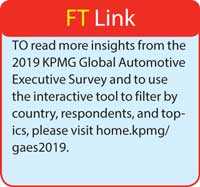Friday Feb 20, 2026
Friday Feb 20, 2026
Friday, 18 January 2019 00:00 - - {{hitsCtrl.values.hits}}
As the global auto industry enters a phase of restructuring, global auto executives named connectivity and digitisation the number one automotive trend in the 20th KPMG Global Automotive Executive Survey (GAES).
The survey overwhelmingly showed that executives believe a shift in the industry is imminent and players will need to build on core competencies while defining a new role for themselves beyond traditional expertise. However, the results also show that most executives show little fear that auto company profitability will decrease. 
KPMG warns, though, that profitability will decrease as Original Equipment Manufacturers (OEMs) will soon be confronted with tough market conditions and shrinking global markets if they don’t act now to prepare for the industry of tomorrow.
Other key insights identified in the annual KPMG GAES, a survey of almost 1,000 executives in the automobile and technology industry and approximately 2000 consumers from around the world, include:
Dieter Becker, Global Head of Automotive at KPMG, said: “The auto industry will need to get comfortable with being uncomfortable during this time of change. There is simply not one global answer and the industry is currently functioning as a set of connected but distinct islands. These entities will change, merge and transform as the industry embraces the technology revolution. KPMG particularly sees this uncertainty in the area of software driven business. The majority of OEMs surveyed believe they are capable of managing a superior platform service to offer mobility services. KPMG holds a different opinion, as we believe it will be extremely challenging for traditional asset-based players to occupy and compete with tech giants for the software-driven mobility opportunities.”
Regulators acting as the driving force
More than three out of four (77%) of executives are convinced that while OEMs declared themselves responsible for the technological agenda in the past decades, that role is being taken over by the regulator who will set the primary agenda defined by industry policies. Becker said: “Industry policies in Asia and the US seem to be far more advanced than in Europe: 83% of Chinese executives and 81% of executives in the US believe their country has clear automotive industry policies. In Western Europe only half of CEO respondents felt the same.”
Multiple drivetrain technologies will co-exist
Execs globally believe in a fairly even split of BEVs (30%), hybrids (25%), FCEVs (23%) and ICEs (23%) by 2040 – with BEVs taking the lead. And consumers say “no” to fully alternative drivetrain technologies, with hybrids the number one choice for a consumer’s next car choice and ICEs closely following.
Mobility and logistics will merge
The expectations for a mobility and logistics ecosystem are increasing: more than ever before, executives agree (60%) that in future we will no longer differentiate between the transportation of human and goods.
Becker said: “One thing is clear: no player will be able to manage it alone. There is awareness among executives, with 83% agreeing that with the emergence of what we are calling mobi-listics, companies will need to both re-think their business model and also recognise the need for cooperation to create a mobility ecosystem. The company offering the best customer experience to people and goods will likely own the platform.” To read more insights from the 2019 KPMG Global Automotive Executive Survey and to use the interactive tool to filter by country, respondents, and topics, please visit home.kpmg/gaes2019.